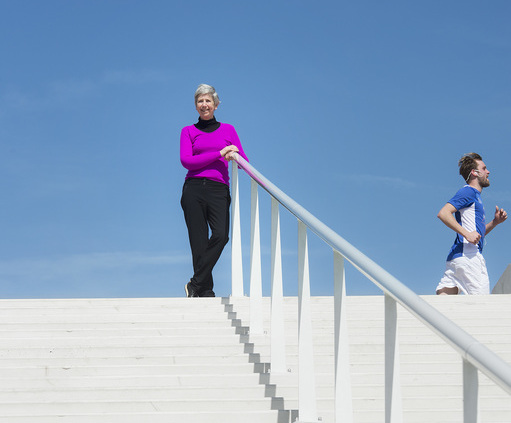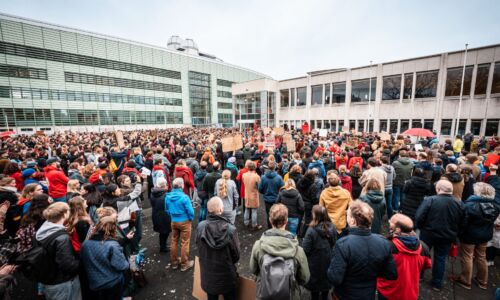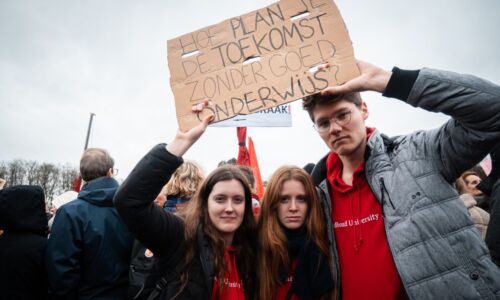‘I learned that you can let things take their course.’
-
 Foto: Bert Beelen
Foto: Bert Beelen
'Chance is beautiful', says theologian Ellen van Wolde. She is one of the promoters of the Week of Chance. How half a matchstick was decisive for her career.
Had the DSB Bank defaulted a week earlier, the world might never have heard of Ellen van Wolde. That would have meant a lot fewer angry people, because of how many people demonised her at the time. ‘And still do’, she said. Ellen van Wolde (61) concluded in 2009 that the opening sentence of the Bible should not be “God created the heavens and the earth” but “God separated the heavens and the earth.” This was due to a mistake in the first translation made hundreds of years ago (see the Textbox). It was one of the findings that the Exegesis of the Old Testament professor wanted to announce to the world in her inaugural address. But two days prior a journalist from national newspaper Trouw called her, responding to a press release from the university.
‘I was in a hurry, because I was about to catch a train’, van Wolde recalls. ‘I was going on a day trip to Burgers’ Zoo. A bit of peace and quiet before the bustle of the inaugural address.’
‘It scared the living daylights out of me, and I bolted out of bed.’
The interview with the journalist lasted no more than ten minutes. ‘I didn’t even realise that this was already the interview. I thought we still needed to make an appointment.’ Van Wolde caught her train and relaxed peacefully among the fishes at Burgers’ Ocean. From within the glass tunnel she saw eagle rays glide gracefully through the water above her head.
‘The phone has been ringing off the hook for you’, her husband said when she arrived home that evening. ‘I’ll deal with that tomorrow’, she thought, still thinking of the eagle rays as she went to bed. In her bedroom she quickly turned on the radio for an update of the news.
‘The presenter was reading out the newspaper headlines. On the front page of Trouw appeared the headline ‘God did not create the world’, says Ellen van Wolde. ‘It scared the living daylights out of me, and I bolted out of bed.’
And thus it began, the news that would snowball across the world and would crush the faith of believers. Journalists from England, Ukraine and New Zealand called Nijmegen. ‘No, it was not a carefully planned media strategy’, says van Wolde, laughing. Au contraire, Trouw was probably short on headlines that day and placed the Nijmegen professor on the front page. That’s what she meant when she said ‘Had DSB Bank defaulted a week earlier…’
Was it to her disadvantage? No. Angry respondents were to be expected. ‘The Bible is sacred, and should be left alone!’ But van Wolde had started her research with an open mind. Could it be, she asked herself, that the writers of Genesis more than two thousand years ago had meant something else? And could she prove it? That she could. ‘One thing that was rather disappointing is that fellow theologians actually wanted to avoid this topic, while I wanted them to present their arguments, so we could have a discussion.’ What she discovered as a result of this whole hoopla was how alive her field was.
Judo classes
Ellen van Wolde is a strong advocate of chance. Just accept things, she says. Stop trying to explain everything. Chance had already played a helping hand in directing her life once before. Half a matchstick proved decisive.
She slows down her walk for a bit on the Mookerschans. She had suggested we conduct the interview while going for a stroll, because she likes to go for walks to think in the open air. She thrives in peaceful surroundings.
Ellen van Wolde grew up in Groningen, in a catholic family, though they were not strict. Ever since she was a little girl she wanted to be a great thinker. ‘I was so happy I could learn’, she says, her eyes wide and childlike. ‘In secondary school I was ecstatic! While cycling home at the end of the school day, I would often think ‘I know something new that I didn’t know this morning.’’
Van Wolde loved philosophical questions. She was the first in her family who wanted to go to university. Her parents encouraged her. There was no question of ‘Why not go to home-making school, sweetie.’ ‘They highly valued independence and self-reliance. My father taught me judo at home. You need to be able to defend yourself. Fight back, don’t run away.’
‘In the beginning, God separated the heavens and the earth.’ Instead of the usual, ‘In the beginning, God created the heavens and the earth.’ Ellen van Wolde made international headlines in 2009 with this translation of the Bible’s opening sentence. Why? Because this implies that God did not create everything, but that some things were already in existence prior to his creation. Van Wolde believes that the Hebrew verb bara does not mean ’to create’ but ’to separate’. This would invalidate the image of a God who created something from nothing. He separated the waters: the waters which were above were called the heavens, the waters which were below were called the earth.
‘However’, says van Wolde, ‘after parting the waters, he did create all kinds of things. That nuance did not reach the media, as it was far less interesting.’
She chose theology in Nijmegen, because at the open day in Groningen she only met people wanting to be priests. Not her thing.
In the first week, her Old Testament lecturer, Father Jan Nelis, said he was looking for a student assistant. ‘There were two candidates, including myself. He let us draw matchsticks. I drew the lucky stick.’
Her work? Sifting through religious texts. Contrary to her expectations, it was fun. She learned Hebrew and let language and culture carry her to a different time, a fascinating time. So it made sense that, during her study, she left for Rome to attend the Pontifical Biblical Institute. She spent two academic years there at the bottom of the Catholic hierarchy. She was a ‘laica’, a female novice – below the priests, Jesuits, friars, laymen and nuns. She laughs again, ‘It’s funny how you can come from a country that’s very different in terms of hierarchy and suddenly find yourself at the bottom of the totem pole. I found it more funny than annoying.’

Van Wolde then specialised in semiotics, the study of signs. How do we allocate meaning to events that happen around us? She studied with Umberto Eco, the (recently deceased) master of semiotics, in Bologna. Coincidentally the Dutch translation of The Name of the Rose was published shortly after her return to the Netherlands in 1983. All of a sudden, Eco was an international star.
Breast cancer
Ellen van Wolde eventually became an exegete. She explains her profession. ‘Just like medical specialists explain physical features as symptoms or signs of diseases, exegetes explain Bible texts as symptoms of meaning. We see texts as the carriers of certain ideas.’
The different ways in which people assign meaning to events in their lives fascinates her immensely. Some people want an underlying, coherent and all-explanatory pattern; others surrender to the universe.
Her opinion was that one should let go of that longing for explanatory patterns. Accept the random nature of events that befall you. But she did not always have this attitude.
She did not learn the beauty of letting go until she was diagnosed with breast cancer. She was in her early forties. Her response was not ‘why me’, but rather ‘so many people get breast cancer, and now so have I’. She concluded her work activities and surrendered to the treatment. ‘Chemotherapy, the whole shebang. I was out of commission for an entire year.’
Van Wolde turns her head towards the sun. She is clearly enjoying the warmth. She takes off her gloves. ‘My period of illness was a kind of revelation’, she says. ‘Suddenly, so many people were there for me: my husband, my family, my friends. It enabled me to see them clearer than before. A beautiful thing. It really improved my view of life. I thought, ‘What an idiot I am, always studying.’’
She could no longer study now, as the chemo had affected her eyes. ‘The funny thing is, I didn’t even mind.’
Her situation wasn’t looking good, and the cancer seemed to have spread to her lungs. For five years van Wolde thought she had only two years left to live. She wanted to spend those years as comfortably as possible. She and her husband did not have children, but they still moved to a larger house with more light. ‘I wanted to get out of our previous house which for me was linked to being sick.’
In the period after the chemo she spent a lot of time walking with all the people she loved. She did not (and does not) believe in life after death – ‘I think that idea was created to keep people small’ – so she had nothing to fear. ‘All we have is the here and now.’ Does this mean van Wolde is not religious at all? ‘Sure I am, in my own quirky way. I do not believe in the idea of an omnipotent, all-powerful being. But when I’m walking through nature, I ponder its beauty and I’m truly thankful.’
The thing she likes about belief is the related perspective of looking at the big picture; looking down from a helicopter on the hustle and bustle on earth and wondering what is most important in life. For yourself and also for others. ‘I have always tried to live up to the ideal that whatever I do should not just be for me. This is why I want to start writing books again, so others can also learn from the knowledge I have gained. I want to make people reflect.’
Ellen van Wolde did not die of breast cancer, but the disease did change her. ‘For the first time I experienced the fear and anguish of thinking, ‘What if it comes back?’ But in other areas my confidence has increased. The funny thing is that I’d always thought I needed to handle everything myself. I wanted to understand and plan everything. Discipline was my way of getting things organised. I learned that you can let things go a little more; leave more to chance.’
Knowledge deficiency
The Week of Chance (16-20 May) has been organised partly due to her initiative as one of the promoters. What does she hope to achieve by it? ‘I want to encourage people to reflect on chance in science. Physical scientists usually focus on ratios: attributing something to chance is seen as a knowledge deficiency – you simply lack the necessary knowledge to see the pattern. On the other end of the spectrum are the humanities scholars and social scientists, who say we create patterns ourselves from a need to give meaning to an elusive reality.’
‘Chance plays a part in both types of science. As an infringement on our tidy explanations, as the unexpected that messes with our expectations, as a corrective nudge to awaken us to our own limited perspectives.’
The older she gets, the more she realises that the knowledge we gain is a result of chance as well. ‘Sometimes there is an academic who through a convergence of circumstances develops interest in a small speck of the world’s possible knowledge’, as was the case with her.
‘There is more that we don’t know than we do know. We don’t even know how much we don’t know.’ Her gaze wanders over the vast heathlands, of which we cannot see the beginning or the end. ‘This is the way things are. And to be honest, I kind of like it that way.’



